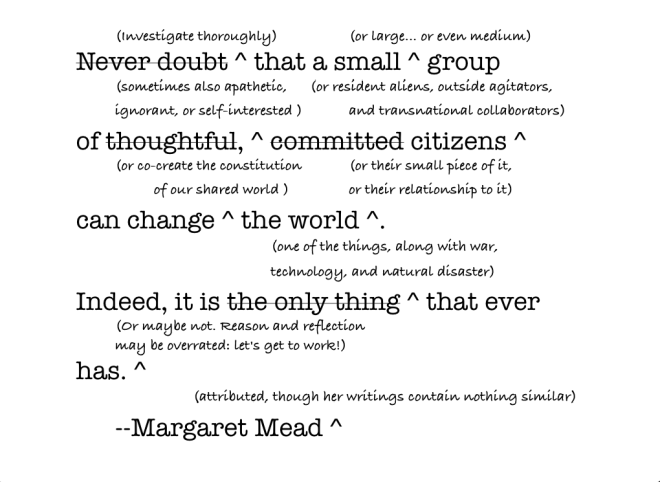Many of my own fellow-travelers police progressivism in a way I sometimes find frustrating. It is de rigeur to chastise neoliberals and technocratic moderates for their lack of radicality. My work tends towards the technocratic/participatory divide around how policies should be made, and so I often don’t have strong policy preferences unless I’ve researched a question extensively. Thus I may be the wrong person to offer a common sense or standardized progressive defense of the welfare state, but I thought I’d give it a shot. Here goes:
Soft-core Case
- Taxes are the price of a good society. Many of the benefits that citizens enjoy are the positive externalities of our shared institutions, including safety net institutions. Thus, the wealth we earn in the marketplace is only partly due to our own effort, and largely due to social investments. Taxes are thus dividends owed for those social investments, and also the seed capital of future social investment.
- Private charity is laudable, but historically it has always come up short of real need. The welfare state responds to these failures of private efforts to ameliorate real suffering. Meanwhile, public provision of charity has been massively successful at reducing poverty and alleviating suffering. (The measures of poverty that claim otherwise assume away the goods and services supplied by safety net institutions.)
- The regulatory state responds to memorable injustices and documented depredations of private institutions and interests. Public regulation of industrial activity has helped to solve large-scale coordination problems, giving us cleaner air, safer drinking water, and lower mortality than countries who do not regulate those goods.
- It is no coincidence that the richest countries have more pervasive welfare states. Both serious poverty and large inequalities are inefficient for finding talented workers and ensuring that they are not excluded from sectors of the labor market that the rich might be tempted to monopolize.
Medium-Core Case
- There is a plausible case to be made for free markets: they tend to allocate resources more efficiently than alternative institutions when there’s a method for increasing the supply of that good. But free-market principles tend to fail where there are prospects of monopoly, including in situations of desperation where price-gouging becomes possible. Rent-seeking can happen both privately and publicly, but private rent-seekers tend to extract more value from those they exploit than public rent-seekers do.
- When users share a common-pool resource, they gain an incentive to maintain it, punish overuse and free-riding, and invest in future development. Economists have claimed otherwise for years, but eventually they gave Elinor Ostrom a Nobel Prize for her work showing that the so-called “tragedy of the commons” is avoidable.
- The safety net is properly understood as a common-pool resource, in specific, as a kind of infrastructure improvement. A functional public schooling system enhances human capital and makes workers more productive. A functional safety net for the very poor prevents the loss of human capacities to bad luck.
- Thus, there is good reason to choose mixed institutions (polyarchy) where markets and governments work together and in competition, with governments preventing the worst excesses of markets, and exercises of liberty (through exit, voice, collaboration, and innovation) preventing the worst excesses of governments.
Hard-Core Case
- We have stronger obligations to our fellow human beings than our moral psychology is equipped to recognize. The same part of our psyche that ignores the needs of strangers also hates other races and cultures. Group loyalties should be expanded as much as they can be.
- The nation-state partially corrects for flaws in our individual moral psychology. It generates the conditions under which we can recognize a limited set of our collective obligations that transcend our family and friends, making it possible to care for distant strangers, though not yet indiscriminately. We still feel stronger obligations to our co-nationals than to citizens of other countries; we have not yet discovered institutions that can produce recognition of cosmopolitan obligations. These obligations to co-nationals includes duties of care, reciprocity, and non-domination.
- Care and concern require us to seek both institutional arrangements and personal opportunities to engage with our vulnerable neighbors. Reciprocity requires that we ensure that capabilities and vulnerabilities are distributed in an egalitarian manner. Non-domination requires not just that we personally forgo interfering with each other, but that we reject institutional arrangements that allow other parties to arbitrarily and capriciously coerce our fellow human beings.
- Universal welfare programs, like universal infrastructure programs, are better at generating a shared sense of care, reciprocity, and solidarity.
- Universal programs are also more efficient than need-based programs. Universal programs don’t generate perverse incentives and poverty traps. Universal programs also don’t require resources be spent on civil servants to determine eligibility or investigate potential misuse.
Super Hard-Core Case
- Throughout much of our history, the state and private organizations have worked together to create conditions of exploitation. This includes colonialism, slavery, and the successors to slavery, and legalized discrimination against women, homosexuals, and indigenous peoples.
- Most large pools of intergenerational wealth are the product of those or other abuses, and most people earning above the median income are benefiting from that history of plunder as well. Other larger pools of wealth are primarily due to the financial sector which is propped up by the public regulatory state and through corporate capture of the state’s policies. Thus taxes and social spending are usually-inadequate efforts to repay those debts.
- Libertarians are right to note that redistributive efforts have usually failed to change the basic inequalities of distribution in our society, and that large regulatory states provide ample opportunities for regulatory capture and rent-seeking. But the answer is not to give up on reclaiming what has been expropriated, allowing the bandits to keep what they have stolen so long as they promise to raid no more! The answer is to redistribute more effectively, regulate more intelligently, and continue to target the ways that governments and regulators become captured by the interests of the wealthy.
I’ll note that I think the “soft-core” case is somewhat at odds with the “super hard-core” case, which is what often generates divisions between liberalism and progressivism. Yet I think this basically outlines my reasons for a commitment to the welfare state.
My friends who worry about moderate and technocratic ideological inconsistency are wrong, though. I think progressives should worry about governments, a lot. Governments do a lot of bad things, including a lot of things libertarians are good at recognizing and pointing out.
And really, this post was inspired by a libertarian. Over at EconLog, Bryan Caplan offers a “refresher” designed for libertarians who find Scandinavian welfare alternatives appealing. It’s a kind of intervention for prodigals. It works primarily as a reminder to those who are supposed to have known those things, but it works well. In a few short paragraphs, Caplan combines empirical claims about the efficacy of libertarian policies with principled objections (to borders and to the coercion of taxation.) It’s not exactly an argument: more a statement of premises, with an argument perhaps taking the form of a longer book like Michael Huemer’s The Problem of Political Authority.
Yet it’s still enough to provoke debate with other libertarians. And in my view, arguments with one’s fellow-travelers can be helpful for your collective projects. As is not-often-enough-the-case, we are currently contesting the nature of the progressive/liberal divide during the primary contest between Hillary Clinton and Bernie Sanders. It’s worth remembering our basic commitments to public and participatory institutions, as well as to just and competent government.
(Post updated March 8th)



